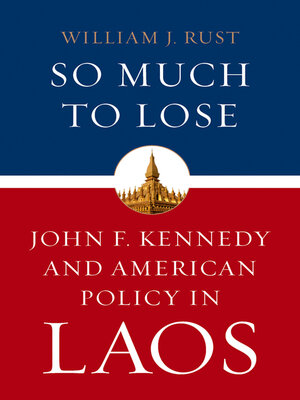
Sign up to save your library
With an OverDrive account, you can save your favorite libraries for at-a-glance information about availability. Find out more about OverDrive accounts.
Find this title in Libby, the library reading app by OverDrive.



Search for a digital library with this title
Title found at these libraries:
| Library Name | Distance |
|---|---|
| Loading... |
Before U.S. combat units were deployed to Vietnam, presidents Eisenhower and Kennedy strove to defeat a communist-led insurgency in Laos. This impoverished, landlocked Southeast Asian kingdom was geopolitically significant because it bordered more powerful communist and anticommunist nations. The Ho Chi Minh Trail, which traversed the country, was also a critical route for North Vietnamese infiltration into South Vietnam.
In So Much to Lose: John F. Kennedy and American Policy in Laos, William J. Rust continues his definitive examination of U.S.-Lao relations during the Cold War, providing an extensive analysis of their impact on US policy decisions in Vietnam. He discusses the diplomacy, intelligence operations, and military actions that led to the Declaration on the Neutrality of Laos, signed in Geneva in 1962, which met President John F. Kennedy's immediate goal of preventing a communist victory in the country without committing American combat troops. Rust also examines the rapid breakdown of these accords, the U.S. administration's response to their collapse, and the consequences of that response.
At the time of Kennedy's assassination in 1963, U.S. policy in Laos was confused and contradictory, and Lyndon B. Johnson inherited not only an incoherent strategy, but also military plans for taking the war to North Vietnam. By assessing the complex political landscape of Laos within the larger context of the Cold War, this book offers fresh insights into American foreign policy decisions that still resonate today.







